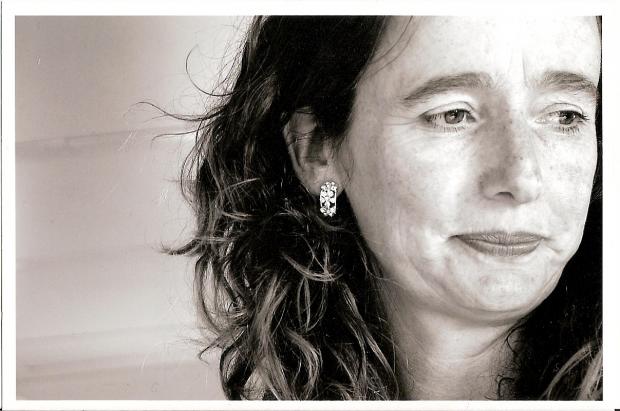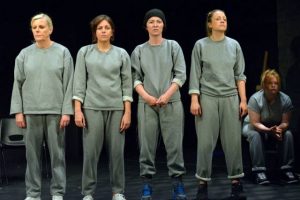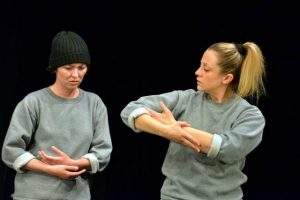
 A writer, activist and co-founder of Open Clasp Theatre Company, Catrina McHugh has been working for decades to bring the voices of women who need to be heard the most to audiences and communities throughout the United Kingdom. After winning the 2015 Carol Tambor Best of Edinburgh Award, McHugh, along with director Laura Lindow and her team, were able to bring the words and experiences of the women at Her Majesty’s Prison Low Newton in North East England to audiences in New York City. This experience is just one stop in Key Change’s global journey – with the goal being to open the eyes of citizens everywhere and join with the leaders of society to inspire a transformation of the prison system and provide alternatives for women.
A writer, activist and co-founder of Open Clasp Theatre Company, Catrina McHugh has been working for decades to bring the voices of women who need to be heard the most to audiences and communities throughout the United Kingdom. After winning the 2015 Carol Tambor Best of Edinburgh Award, McHugh, along with director Laura Lindow and her team, were able to bring the words and experiences of the women at Her Majesty’s Prison Low Newton in North East England to audiences in New York City. This experience is just one stop in Key Change’s global journey – with the goal being to open the eyes of citizens everywhere and join with the leaders of society to inspire a transformation of the prison system and provide alternatives for women.
StageBuddy had the chance to speak with McHugh about her incredible work in the prisons, bringing the stories of women to life on the stage with Key Change, and using the theater to make our world a better place.
Catrina, it is such an honor to speak with you about such a meaningful and brave production and movement. Let’s start at the beginning. What led you to co-found Open Clasp Theatre Company and form a group that gave voice to women’s issues?
Catrina McHugh: The story of Open Clasp began when I was working on my degree at a university in England, and had a project to make a play that gave a voice to women. I worked with four other women on this and we all worked with different groups of women -- young women who were pregnant, lesbians, women in poverty -- and came together to devise the play. We then performed the play in Newcastle and it’s exactly how we work now – collaborating with the women and going into their communities to tell their stories. In this specific piece, there were five women that we were representing and it was called After Her Death and we sold out. We were all passionate about women’s stories and the important issues, and the feedback we received was that we needed to do this professionally and find a way to plan tours.
For Key Change, your team became immersed in the experience of these women in prison -- describe your time in Her Majesty’s Prison Low Newton and your interactions with the women in prison.
We got the commission to go into the prisons and also had to get the Governor to trust our vision so that he could endorse us, with our main goal centered on supporting the women and creating a piece of theater and then coming out the prison and touring to men’s prisons. The first step was asking the women what they would say to a captive audience – with some saying they didn’t want to be the victim or demonize the men or make them feel uncomfortable. We used drama techniques to make a character – giving them a name, age, etc. – and the women were encouraged to ask questions: Who is she? What is her life story? From there, they created moments in her life, making the scene and putting it up like a still image and then taking some time to give thought to how the characters were feeling. It was 10 women all together, who created moments around important issues such as domestic violence, being a refuge, and postnatal depression. They led everything and decided what to look at. In the beginning, the women were a bit suspicious and didn’t completely trust us, but as we introduced techniques they started to share their own personal experiences because they had this safe space, and went on a massive journey to learn the lines and work with us in the process.

What did you learn about the women that surprised you?
We were all collaborating as equals – all with different expertise. All the women completely connected and went, “That’s my story.” The officers also had an opportunity to reflect on the point that these individuals are women and they all had backstories, and weren’t just prisoners.
Another wonderful thing was that the women started to own their characters and walked around the prison identifying as actors. Moments like this changed them – and helped move them away from being offenders. This experience changed their lives and played a crucial role in gaining that respect.
When you took Key Change to men’s prisons, what was the reaction like?
Regarding the men, we then visited high security prison for lifers -- mostly sex offenders -- and it was our first time performing to a male-only audience. The men came in and really responded it – they were able to see the kind of men they were and who they currently were. It was such an amazing experience and a wonderful experience to talk to them, as they would say “This is my story” and were reminded of their own families. We also went to a young offenders prison and could also see the young men saying, “Yes, when I was a kid, I saw my dad like that” [relating to the domestic violence scenes] and really connected to those scenes.
How do you hope audiences in the United States will receive Key Change?
When we went to live theater, we knew we uncovered a massive gem and hoped that it would translate. When we won the Carol Tambor Best of Edinburgh Award, we were then able to take the women’s voices to New York, and we were so incredibly honored. Our mission [while in the U.S.] is to connect with anyone in the criminal justice system and build our support system – to make all those contacts while we are here. Evan Stark [researcher, author of Coercive Control: How Men Entrap Women in Personal Life (Interpersonal Violence) and expert in cases involving domestic violence] will be doing a post-show discussion on Jan. 24th and will put the play into a global concept. His expertise will add to that research and spark conversation about women’s experiences and a need for alternatives for women. It’s so important to have a vehicle to make that change – in this case, through the theater – and it has to be the best it can be.
In addition to showcasing the tougher parts of their personalities, the audience also gets a peek into the women’s personal lives and what their main priorities are, concerning their children. Can you speak to that solidarity?
It’s brilliant because this is really the dream play. All of the actors really carry the women and it’s their first priority to give the best performance on behalf of the women. The direction and choreography are also brilliant and bring the experience to life.
The reality is that they were all women who didn’t know each other in the prison – all with different experiences. Our process enabled them to think about the character first to provide them with that safety, so they could [eventually] get to their own stories. It helped to build trust and forced them to rely on each other for support and in the end, creating a theater piece help made the solidarity happen. We all laughed about things and also cried about things. We structured it so everyone could genuinely trust each other, and creating a show united the women. The whole process enabled them to be themselves and the performance will hopefully enable audiences to feel and have empathy for the women.
How has this experience shaped your own personal view of women in prison?
For me, they’re just like any other women we’ve worked with. It was just being in the environment -- the environment was the strange thing, not the women. It’s made me feel really attached to this type of work and I have a strong desire to continue work in the prisons. I love facilitating conversation around important issues plaguing society and seeing the change you are making. It has also led to trainings for officers and things of that nature. I want to build community inside of the prisons.

The women all share their dreams of life post-release. How would you like to see the system reformed so that this dream can become a reality? What steps need to be taken?
In terms of transition, the funding needs to be there for women’s centers. We need to provide access to courses around domestic violence, legal support, self-esteem, confidence, cooking, gardening and child care for these women. Also the option of community payback needs to be explored. Prison is so expensive and statistics say that women are more likely not to re-offend, so why not get them on community service, and allow them to make that change, and stop being the offender and be who they are and feel valued. Preventative measures and education are key.
Anything to add, in terms of the remainder of the run and encouraging those who haven’t seen Key Change yet, to come out?
Please take an hour to go on an epic journey and take some time to think about what we’ve done. It’s a chance to see the stories and open your eyes – and I hope the message will create lasting impact in our world.
Key Change runs through Jan. 31. For more about Open Clasp, please visit: https://www.openclasp.org.uk/
Performance of Key Change continue through January 31 at 4th Street Theatre.